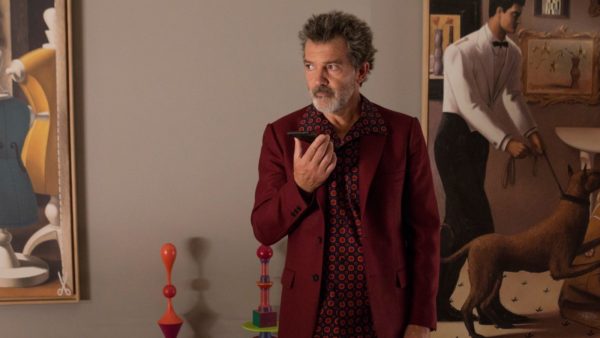Film Review: “Pain and Glory” — Almodovar’s Remembrance of Things Past
By Erica Abeel
What remains so seductive about Almodovar is the way he replicates the movement of thought, creating a seamless weave between the story moving forward — rather minimal in this case — and the richer, more luminous past.
Pain and Glory, directed by Pedro Almodovar. Screening at Coolidge Corner Theater and Kendall Square Cinema beginning October 17.

Antonio Banderas in a scene from “Pain and Glory.”
Coincidentally or not, three of the fall season’s big films are about grownups — more specifically, older men — looking back on their lives and assessing the roads taken or not. Ad Astra from James Grey finds middle-aged astronaut Brad Pitt whizzing through the universe to settle accounts with an absentee father (maybe a stand-in for a cruel, withholding God?) moored in the empyrean. The Irishman by Martin Scorsese revisits the past of a mob hit man for a crime family, focusing on the man’s appraisal of the costs of a violent life. And Pain and Glory, the latest from Spanish director Pedro Almodovar, follows a 60-something filmmaker struggling with creative paralysis, plumbing his past in hopes of discovering a way forward.
Don’t look to Pain and Glory for the unsprung Almodovar of the glory days. (Gems from that canon: the whacked-out Women on the Verge of Nervous Breakdown, a film noir take on a romantic comedy; Tie me up! Tie me down! in which a disturbed young guy kinda kidnaps a porn actress, ties her to the bed, and attempts to win her love.) Pain and Glory finds the beloved Spanish auteur, closing in on 70, in a more melancholy, ruminative mood, embracing cinema as autobiographical fiction. The great Antonio Banderas — in a career-best turn — stands in for Almodovar as Salvador Mallo, a 60-something filmmaker doing battle with a raft of physical afflictions that have shut down his creative engine, reducing him to a pill-popping semi-recluse.
What remains so seductive about Almodovar is the way he replicates the movement of thought, creating a seamless weave between the story moving forward — rather minimal in this case — and the richer, more luminous past. With other filmmakers you often hear the gears grinding; Almodovar dances back, forward, and sideways with an alacrity that lends new meaning to the term “without further ado.” In a nod to his own practice, the opening credits are set against swirling rivers of color, embodiments of fluidity.
We first see Salvador (“Salva”) Mallo (Banderas) vertically afloat underwater in a pool. The actor is a beauteous sight, a vision of virility — but the image turns darker as the camera zeros in on a nasty scar the length of his spine. Instant flashback to a sylvan scene of Salva as a boy, delighting in the sound of his mother Jacinta singing (a ravishing Penelope Cruz), as she and other women from their village wash clothes in the river. Back in the grimmer present, Salva suffers a baker’s dozen of physical ills, ranging from intractable back pain, to tinnitus, anxiety, and panic attacks. He is also afflicted with a nasty habit of choking on food. Almodovar archly illustrates these miseries with clinical diagrams, CAT scans, and X-rays.
In a chance encounter with an actress friend (a cameo for Cecelia Roth), Salva confesses he has reached creative paralysis. I thought you’d never retire, she tells him. “What will you do if you don’t film?” He: “Just live” — only for an artist a life of golf, travel, and the grandchildren may not be a meaningful option.
The planned revival of Sabor, a film Salva made 32 years ago, puts him into contact with its star, Alberto (TV actor Asier Etxeandia), whose performance never satisfied him. During an impromptu visit with Alberto, who is also sidelined, the actor breaks out the heroin in order to alleviate Salva’s back pain. Adding to his other woes, the “dragon” of heroin quickly sinks its fangs into Salva. Yet, ironically, this dark byway ends up igniting a creative spark. During a visit to Salva’s apartment, a riot of color, Alberto becomes intrigued by a script on the computer called The Addiction and bullies the director into allowing him to perform it as a theatrical monologue.
Implausibly — never a worry for Almodovar — a beloved from Salva’s youth in Madrid happens to attend the performance. The lover’s drug addiction all but wrecked their relationship. Through an intricate maze of memory and happenstance, Salva finds himself within spitting distance of his next project
The mother-son bond has always figured prominently in Almodovar’s canon, so no surprise that the bulk of the film’s emotional heft comes via Salva’s ties to Jacinta — both old in the near-present, and young in their past in post-Civil-War Spain. In quietly searing scenes, his aged mother (played by Julieta Serrano) upbraids Salva for not “taking her in.” “I’ve failed you simply by being as I am,” Salva says, in a line bound to resonate broadly.

Penélope Cruz in a scene from “Pain and Glory.
Earlier, the impoverished family lives in a cave, considered by their fellow villagers as a desirable lodging. True to form, Almodovar’s cinematographer transforms the whitewashed space, through the application of an odd blaze of rainbow colors, into a candidate for Decor magazine. Cruz is terrifically affecting as the embattled Jacinta, her severity toward her young son born of worry over his fate and (perhaps) suspicion of his sexual leanings. This fear is amped up when a hunky illiterate neighbor comes to paint the house and Salva teaches him to write and read, guiding the young man’s hand as it holds the pencil. In a master stroke, Almodovar lights on a sequence of events that perfectly conveys the boy’s first experience of desire. And perhaps spurs the director to create his next work.
Banderas (who won Best Actor in Cannes) does not so much channel or impersonate Almodovar as create a distinct persona standing in for the director. Film buffs will recall the pair’s long and fabled artistic collaboration. It could be objected that Banderas looks too damn good, a vision of the masculine ideal, to portray a man battered by health issues. But viewers crave something to delight the eye — particularly in an Almodovar film — so we willingly suspend disbelief.
Banderas effortlessly summons a range of emotions, from vulnerability and fury at the indignities of age to lusty remembrance of an earlier love to an adoration of his mother, young and old. In his apartment (reportedly the director’s own), Salva is framed by Almodovar’s lush vocabulary of color — a character in itself — which includes vermilion and peacock green as well as screechy colors from some psychedelic planet. Sabor is the title of the film within the film, Pain and Glory. The word translates as “flavor” but, as Almodovar explained in the Q & A following the press screening of the movie at the New York Film Festival, in Spanish it conveys the notion of something richer and burnished, delectable to all the senses. And that precisely describes the deep “flavor” of Pain and Glory.
Erica Abeel is a novelist, film and cultural critic, and former professor at CUNY. Her recent novel Wild Girls, about three women rebels of the 50s, was an Oprah Magazine pick. Her journalism has appeared in the New York Times, Indiewire, and other major sites and national publications. A former dancer, when not writing, she’s in a Pilates class or at the barre.

Great review, makes me even more interested in seeing it , which I will do next week! Loved “Implausibly — never a worry for Almodovar” . Thanks.